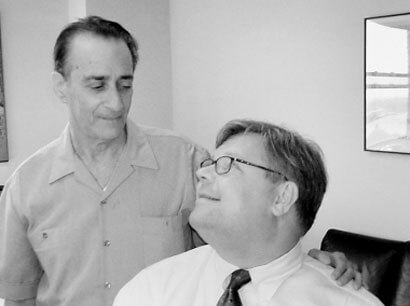Tom Duane recalls Reagan at David Rothenberg fund-raiser
Bette Davis took a drag on a cigarette, looked down from wherever she is, or maybe up, and said: “Go for it, man,” so Tom Duane heaved a big sigh, wrapped his hands around his brow, thought a long thought, and went for it.
“He may have been a very pleasant man,” Duane said, last Thursday night, as Ronald Reagan lay in state in the Capitol Rotunda in Washington, D.C., “but I’m very angry about all the people who died during his presidency because of his inaction.
“I had”—Duane drew a breath, then emphasized the next word—“hundreds of friends… friends or acquaintances… who died [as a consequence of AIDS] in the 80s. My best friend Jim Lemonn, who was studying to be an Episcopal priest, was one of them.”
A half-hour later, at H.E.R.E, the energetic little Off Off Broadway theater complex on Sixth Avenue just below Spring Street, out gay Chelsea Democratic state Senator Duane’s role model David Rothenberg would, on behalf of Duane’s re-election campaign, be “name dropping” wonderful sagas about Bette Davis, Elizabeth Taylor, Richard Burton, Julie Harris, Peggy Lee, Alvin Ailey, John Gielgud, Alexander Cohen, Joan Hackett, Fay Wray (“David Rothenberg?” she’d exclaimed, “I’m Fay Rothenberg!”), Tennessee Williams, and dozens of others Rothenberg has worked for over the years.
But now, urged by a journalist for his further thoughts on Reagan, Duane said: “I know you’re not meant to speak badly of the dead, I’m sorry for his family, and I know some people liked him, but he was also responsible for the death by torture of hundreds of people in Salvador and Guatemala, as well as for the Iran-Contra scandal. Terrible things happened on his watch.”
And he wasn’t done yet.
“And oh yes, when he went a laid a wreath at Bitburg, he showed his true colors,” added Duane, referring to Reagan’s decision to honor a German cemetery that contained the graves of Nazi SS troopers.
David Rothenberg has been, and remains, a political activist. In 1967 he brought from Toronto and produced, at the Actors’ Playhouse on Sheridan Square, John Herbert’s “Fortune and Men’s Eyes,” a drama pinioned on the gang rape of a young homosexual in a Canadian detention center.
That same year, Rothenberg was the prime mover in founding the Fortune Society, then and to this day a support group and halfway house for ex-convicts. In 1973 he came out of the closet, on television, on the David Susskind show, and in 1985 he became the first out gay candidate in city history to run for the New York City Council, and only lost because Manhattan’s Carol Greitzer was such a popular incumbent.
It was before all this, as a very young theatrical press agent on the 1961 Broadway production of “Night of the Iguana,” that Rothenberg had been told that its star Bette Davis “will chew you up and spit you out as bad meat.”
That didn’t happen. Miss Davis made him laugh, he made her laugh, and they took to each other famously.
“In those days, every comedian in town was impersonating Bette Davis,” Rothenberg recalled, “and so was she… puffing cigarettes like an imitation of Bette Davis,” which she was still doing up to the year of her death.
And then there was the time in 1964 when, by default, Rothenberg became Elizabeth Taylor’s date at opening night of the Richard Burton “Hamlet” on Broadway.
“I always say I’m the only man Elizabeth Taylor dated who didn’t marry her,” he recalled.
To enrich yourself with all the other extraordinary anecdotes in David Rothenberg’s storehouse—starting with the day Stan Musial of the St. Louis Cardinals tousled seventh grader David’s hair in the bleachers of the Polo Grounds, thus making the kid a hero even to the ninth graders, you’ll have to keep an eye on the schedules of the Keen Company (keencompany.org), where Rothenberg and his “Namedroppers” keep getting brought back by popular demand.
“David Rothenberg—a multi-talented person and amazing New Yorker” said Duane to the audience at H.E.R.E.
But before he bestowed that accolade, Duane, a big man on a hot night, had mopped his brow and said, “Oh my goodness. I guess I’ve known him personally since the 1980s, but I was sitting watching TV in Queens with my father when David came out on the Susskind show. I was 18. It had a tremendous impact on me. Just life-changing.
“I was in college then, Lehigh University in Bethlehem, Pennsylvania. I came out, there in college. We started a gay group. It was the first time I ever experienced anti-gay bias. No, I wasn’t physically hurt, but I had things thrown at me, threatening telephone calls.”
David Rothenberg faced worse in his time, as a youg man joining a sit-in at an all-white drug store in the nation’s capital in the early 1960s, as a heart-stricken member of the Observers’ Committee during the bloody Attica Prison riot/suppression of 1971, and as an observer dodgingbullets side by side with peasants in Nicaragua in the 80s.
“It all made me stronger and tougher,” he says. “So I worked for a year on Broadway for Lauren Bacall, and if you can do that…”



































